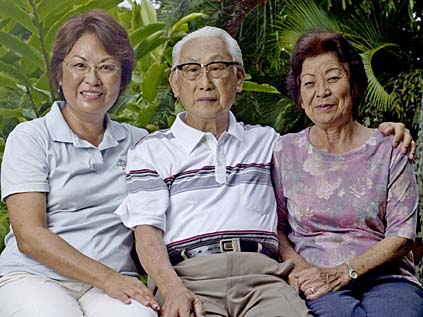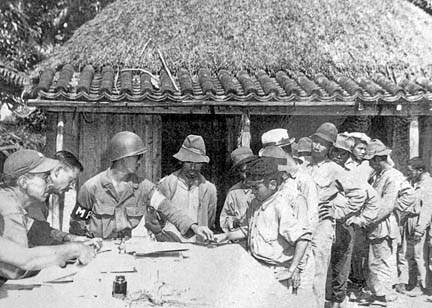

|
WWII interpreter
saved civilians
The Hilo-born soldier was honored
for his efforts on Okinawa
A few months after the Marines invaded Okinawa in 1945, Teruto Tsubota, a Japanese interpreter with the U.S. Military Intelligence Service, stood at the mouth of a cave on Tsuken Island.
"I was stripped to my waist to show the people (civilians) hiding in the caves that I wasn't armed," said Tsubota, now 83. "Behind me an American officer had pulled out his pistol and was threatening to shoot me if I went into the cave. I'd tell them the cave was about to be blown up, but they were too afraid. The Japanese soldiers told them the Americans would rape and kill them."
But the last words of his father, Sadaji Tsubota, before Teruto left for the war, came to him: "War is not only shooting and killing. Saving lives is also a part of war."
Saving lives is what Teruto Tsubota did that day -- estimating that he lured at least 20 people who were hiding in the cave, ready to commit suicide.
"He was a quiet man," Tsubota said of his father. "I think that was the longest talk he ever gave me."
"Inside some people pretended to be dead and didn't move even when I nudged them. No one would answer me because we were considered bitter enemies.
"There was a group of six to eight girls -- all about 10 years old. They were shaking and shivering from shock. I got them to leave."
Forty years later, Tsubota, who had chosen to live and work on Okinawa when the war ended, was in a bar in Futenma when its owner asked him: "Are you that Tsubota-san? Are you that Tsubota-san from Tsuken?"
After Tsubota acknowledged her question, the woman told him that she was one of the girls whom he had saved.
Years after the war, he would be honored by the people of Tsuken.

|
This summer Tsubota was one of the honored guests at the 59th anniversary of the Battle of Okinawa held in the Okinawan Memorial Peace Park in Itoman to commemorate the more than 200,000 men and women who had died in the conflict.
He was one of 30 Americans invited to participate.
"This was only the second time I was invited," Tsubota said.
He said he owed it to his friends who did not survive the battle to attend.
At cenotaphs in the Cornerstone of Peace area at the Okinawa Peace Memorial Park, relatives of deceased family members held prayer services. The names of the more than 236,000 names of the men and women who lost their lives in that battle are inscribed on the walls.
The actions of more than 6,000 Japanese Americans, roughly half from Hawaii, in the Military Intelligence Service have gone largely unreported.
They gathered vital information from captured Japanese documents, intercepted radio messages and served as interpreters for the nation's highest commanders in the Pacific and were described as the country's secret weapon in the war against Japan.
Tsubota, who has been living on Okinawa since 1951, in 1947 married a woman he met there. He was home recently to visit one of his three children, Renee Horie, who lives in Kaneohe. Tsubota worked on the U.S. bases on Okinawa and retired in 1993.
Tsubota was born in Pahoa on the Big Island and graduated from Hilo High School in 1941. He was drafted in 1944 and did his basic training near Wahiawa before attending language school at Schofield Barracks for three months.
In April 1945, he was assigned to the 6th Marine Division and, like many other MIS interpreters, worked alone.
"My job was mainly to be available when the Marines picked up civilians," Tsubota said. "Then it was my job to go out and pick them up and take them to camp Kamaa at Koza in central Okinawa."
After he rescued the 20 Okinawan civilians, his commanding officer asked him why he disobeyed the order not to enter the cave.
Tsubota told him he noticed "ashes at the entrance and they were hot.
"I went to the entrance and called, but no one answered. But it was too quiet ... If there wasn't anyone in the cave, the insects would be chirping and there would be rats running around."